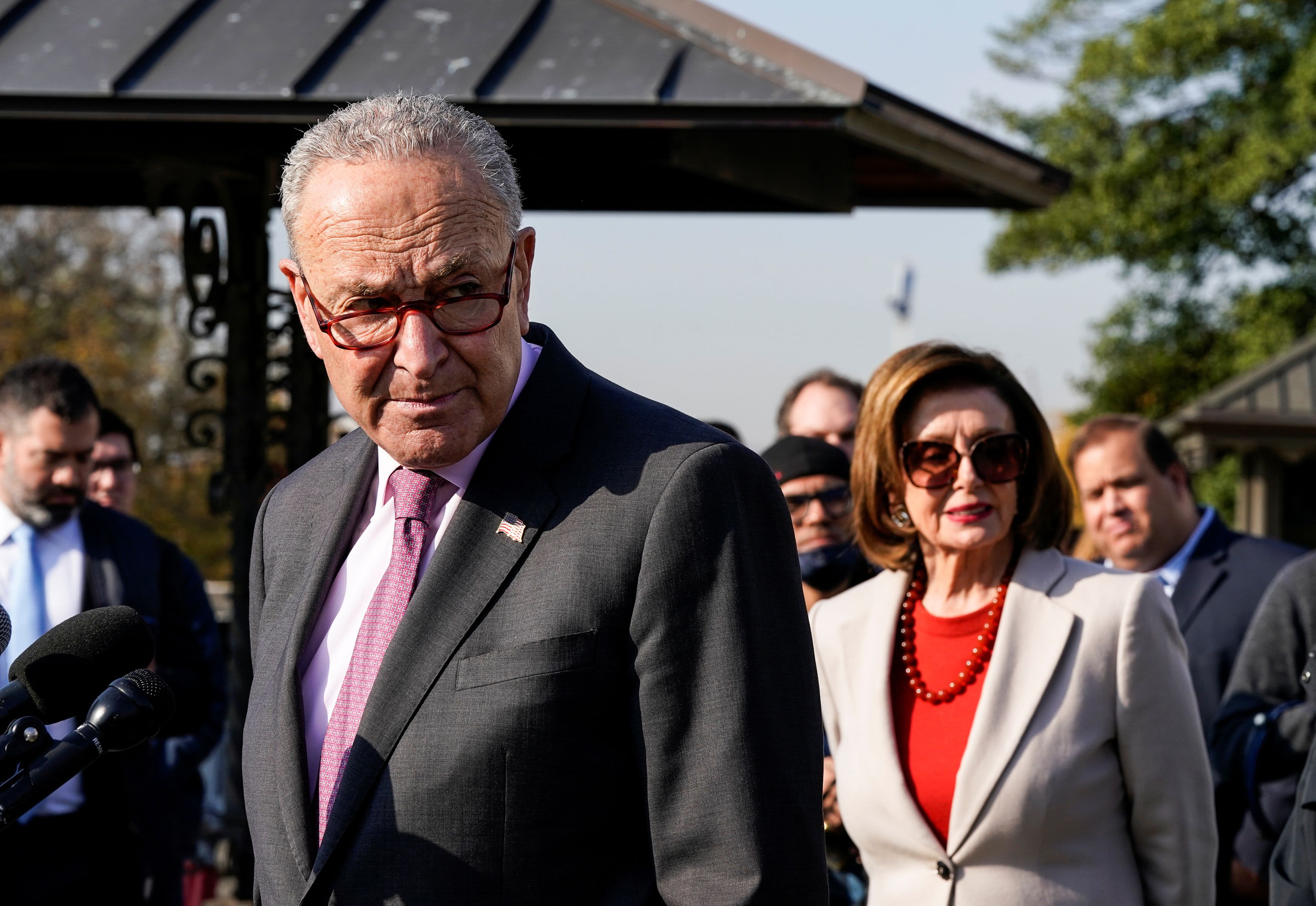
U.S. Senate Majority Leader Chuck Schumer (D-NY), House Speaker Nancy Pelosi (D-CA) and Congressional Democrats discuss the ‘Build Back Better Act’ and climate investments during a news conference at the U.S. Capitol in Washington, November 17, 2021.
Elizabeth Frantz | Reuters
Republicans may help Democrats lift the debt ceiling after all — in their own way.
GOP congressional leaders have said for months that they will not vote with Democrats to raise the debt limit and snuff out the threat of a first-ever U.S. default. Top lawmakers may have found a new way for Democrats to hike the borrowing cap before Dec. 15, the estimated date when the Treasury will no longer be able to pay its bills.
The process would be complicated and carry risks. If the House and Senate can pull it off, Washington would quash the risk of a default that could wreak havoc on the global economy and stock markets.
The strategy would tie the effort to raise the debt limit to a bill designed to prevent automatic Medicare spending cuts set to take place at the end of the year. Lawmakers would pass a provision in the health-care bill that would allow the Senate to increase the debt ceiling one time with a simple majority vote.
Under the plan, at least 10 Republicans would have to vote to allow Democrats to hike the borrowing limit on their own. Then Democrats, who hold a majority in the 50-50 Senate through Vice President Kamala Harris’ tiebreaking vote, could raise the debt ceiling in a separate vote without GOP support.
The House Rules Committee is set to consider a version of the Medicare bill that includes the debt-limit language on Tuesday. The full House could pass it as soon as Tuesday night.
If both chambers of Congress pass the legislation and President Joe Biden signs it, Democrats can then hold separate votes to hike the debt limit. Democrats’ plan would raise the borrowing ceiling by about $2 trillion, enough to carry the U.S. through the 2022 midterms, a source told CNBC.
Senate Majority Leader Chuck Schumer expressed confidence Tuesday that Congress would stave off a default — without specifying how it would do so.
“Over the past few days we have made good progress on this issue and I’m optimistic that we will be able to prevent the awful prospect of the U.S. defaulting on its sovereign debt for the first time ever,” he said on the Senate floor.
The proposal would offer some relief to both parties. Republicans would not have to vote for a debt ceiling increase. Democrats would not have to include a borrowing limit hike as part of the budget reconciliation process they are using to try to pass a $1.75 trillion social spending and climate package.
As part of the strategy, Democrats would have to set a specific dollar figure for the debt ceiling, which Republicans could try to use as a political weapon.
Congressional leaders considered adding the debt-ceiling language to the National Defense Authorization Act, an annual bill that sets defense spending levels, instead of the Medicare legislation. They decided against it, as the NDAA vote would have been more politically tricky both for Senate Republicans who oppose the debt-limit maneuver and progressive House Democrats who are against defense spending hikes.
Schumer and Senate Minority Leader Mitch McConnell have held talks about how they could prevent a default. But it is unclear whether enough GOP senators would sign off on the developing plan for it to succeed.
Sen. Roy Blunt, R-Mo., told reporters he expects the strategy will win enough Republican support.
“Everybody is hearing a lot from hospitals at home about the importance of solving this Medicare problem. And so maybe, hopefully, a bigger vote,” he said, according to NBC News.
Both parties have typically supported raising the debt ceiling, a routine process for decades. The GOP has argued Democrats should increase it on their own this year as they push to pass their $1.75 trillion social spending and climate package without Republican votes.
Hiking the borrowing limit does not authorize new spending. Treasury Secretary Janet Yellen has also noted Congress would have had to raise the debt ceiling regardless of whether Democrats passed spending bills this year.
— CNBC’s Ylan Mui contributed to this report




